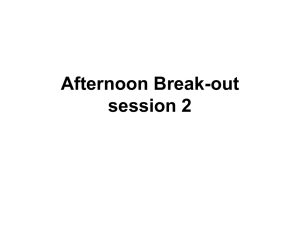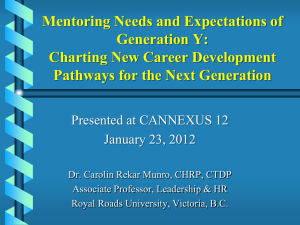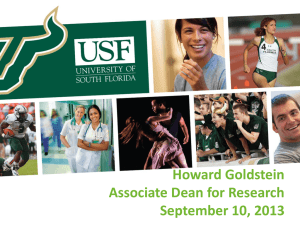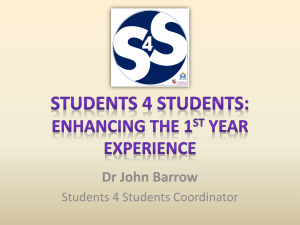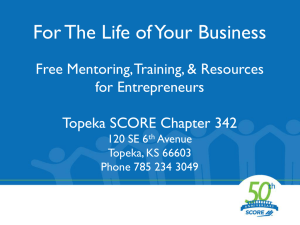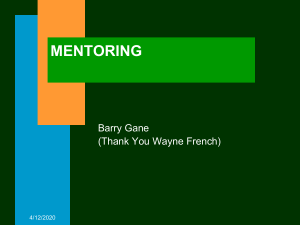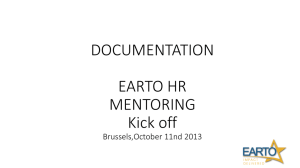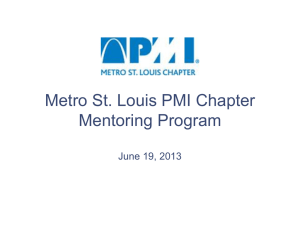334 – Graduate Students as Mentors to Enhance Undergraduate
advertisement
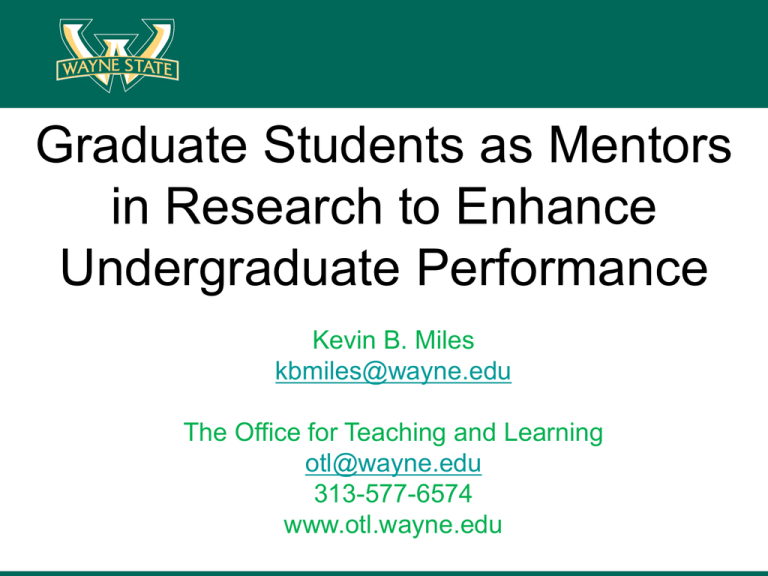
Graduate Students as Mentors in Research to Enhance Undergraduate Performance Kevin B. Miles kbmiles@wayne.edu The Office for Teaching and Learning otl@wayne.edu 313-577-6574 www.otl.wayne.edu Expected Outcomes • After this presentation the audience will be able to: o Recognize sound (and active) mentoring practices o Review examples of good mentoring practices from studies conducted in the STEM fields (academic, public and private sector) o Design mentoring practices into their teaching (for practical/lab courses) or research Introductions • Tell us who you are! • Turn to a partner and introduce yourself (e.g., name, college and role) o Discuss what actions are involved in mentoring. o Active vs. passive Mentoring Background Mentoring: • Homer’s Odyssey, “Mentor” Teacher and overseer to Odysseus’ son - • “Mentor” as an English term: - Trusted advisor Teacher Wise person • Traditionally, university faculty have acted as mentors to students - Increasing class sizes - More demands on faculty time (Shea, 1997) Mentoring Definition “…the essential attributes of: a process; a supportive relationship; a helping process; a teaching-learning process; a reflective process; a career development process; a formalised [sic] process and a role constructed by or for a mentor.” (Roberts, 2000, p. 162) Mentoring Definition “…the essential attributes of: a process; a supportive relationship; a helping process; a teaching-learning process; a reflective process; a career development process; a formalised [sic] process and a role constructed by or for a mentor.” (Roberts, 2000, p. 162) Mentoring Definition “…the essential attributes of: a process; a supportive relationship; a helping process; a teaching-learning process; a reflective process; a career development process; a formalised [sic] process and a role constructed by or for a mentor.” Graduate students are well positioned for these attributes: o o o Typically closer age to undergrads “In the field/lab” instead of “in the office” Obligations place them in proximity to undergrads (Roberts, 2000, p. 162) Mentor-Mentee Relationship Who here is in a “mentoring role”? Share some examples Evidence: Mentoring for Clear Career Plans Mentoring undergraduates to improve career goals: o Lunsford (2011) examined interview records from 128 academically talented students who partnered with a faculty mentor for 6 semesters. o Interviews were analyzed for: 1. Quality of relationship with the mentor 2. Career plan or outlook of career opportunities in field of study (Lunsford, 2011) Evidence: Mentoring for Clear Career Plans 30 Number of Students 25 20 15 10 Great 5 Good 0 Average Poor (Lunsford, 2011) Evidence: Positive Outcomes of Mentoring Positive outcomes from mentoring study: o Enrolled undergraduate students in an Entering Research course o Faculty mentor responsibilities: • • One-on-one meetings Guided discussions of research, future careers o Control group = undergraduate researchers not enrolled in the Entering Research course. (Balster et al., 2010) Evidence: Positive Outcomes of Mentoring Results from enhanced mentoring: o Entering Research students gained: Compared to control o More lab skills o Increased confidence o Better understanding of the links between coursework and research (Balster et al., 2010) Evidence: Positive Outcomes of Mentoring Results from enhanced mentoring: (Balster et al., 2010) Evidence: Outcomes from Lack of Mentoring Study on effects from a lack of mentoring: o Undergraduate students in various co-op and internship positions were interviewed. o Co-ops were either government or private industry o Interviews involved surveys regarding: o o o Communication with coworkers Self-assessment of company knowledge Awareness of future prospects in company/field. (Fifolt & Searby, 2010) Evidence: Outcomes from Lack of Mentoring Results: o Students with supervisors who did not adequately set aside time felt: o Confused o Unproductive o Lack of communication with the rest of the workforce. (Fifolt & Searby, 2010) Conclusion 1. Mentoring significantly improves undergraduate performance • Clear career plans prior to graduation • Better understanding of practical applications of coursework • Improved communication with colleagues 2. Graduate students could be useful stand-ins for faculty in process • Grad students are typically closer in age to undergrads • Closer contact with undergrads due to nature of work • Graduate students receive training as future faculty Reflection Discuss with a partner: How can you use these strategies to improve student-mentor relationships in your classroom or lab? Questions or Comments References Balster, N., Pfund, C., Rediske, R., & Branchaw, J. (2010). Entering Research: A Course That Creates Community and Structure for Beginning Undergraduate Researchers in the STEM Disciplines. CbeLife Sciences Education, 9(2), 108-118. doi: DOI 10.1187/cbe.09-10-0073 Fifolt, M & Searby, L. (2010) Mentoring in Cooperative Education and Internships: Preparing Proteges for STEM Professions. Journal of STEM Education, 11 (1&2), 17-26. Lunsford LG. Psychology of Mentoring: The Case of Talented College Students. Journal of Advanced Academics. 2011;22:474-98. Roberts, A. (2000), “Mentoring revisited: a phenomenological reading of the literature”, Mentoring & Tutoring, Vol. 8 No. 2, pp. 162 Shea, Gordon F. (1997) Mentoring (Rev. Ed.). Menlo Park, CA: Crisp Publications

